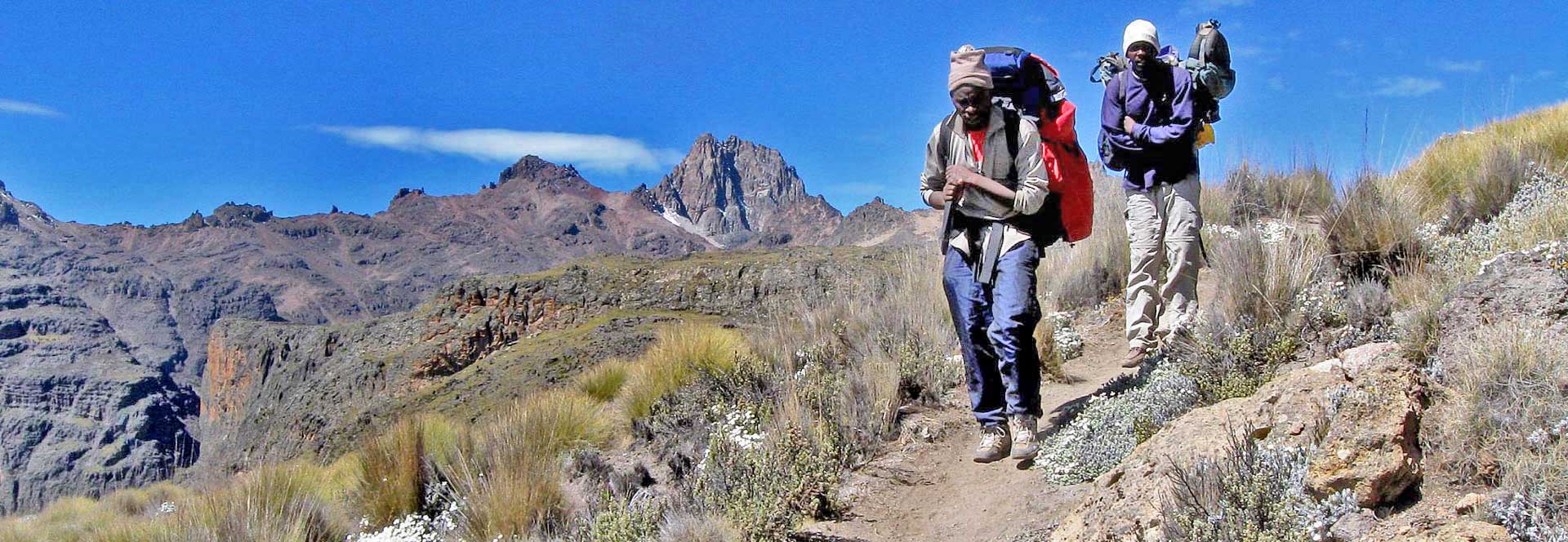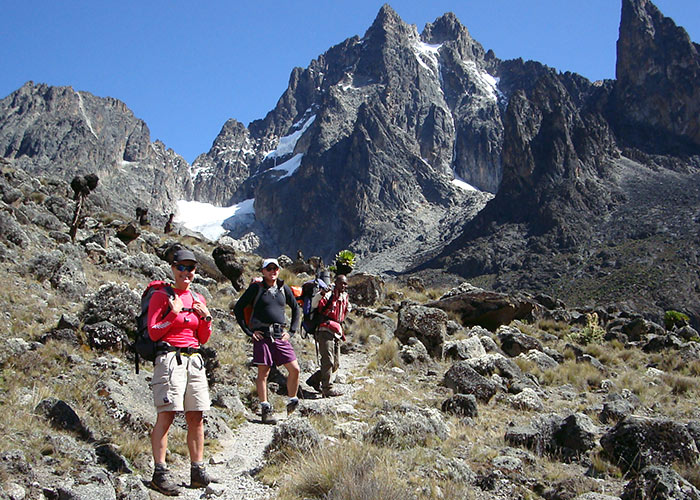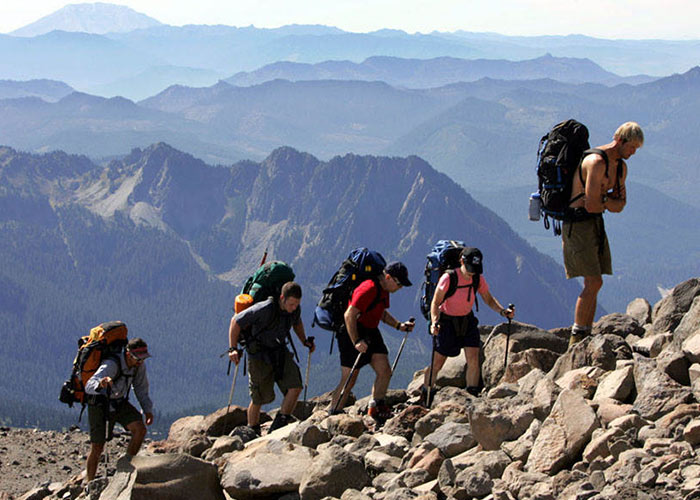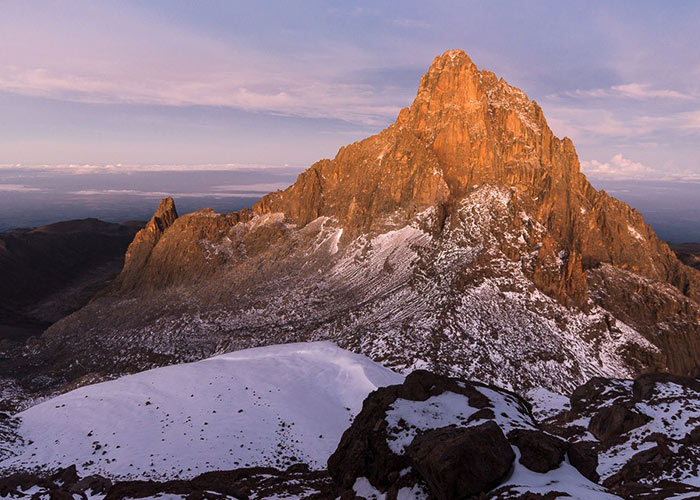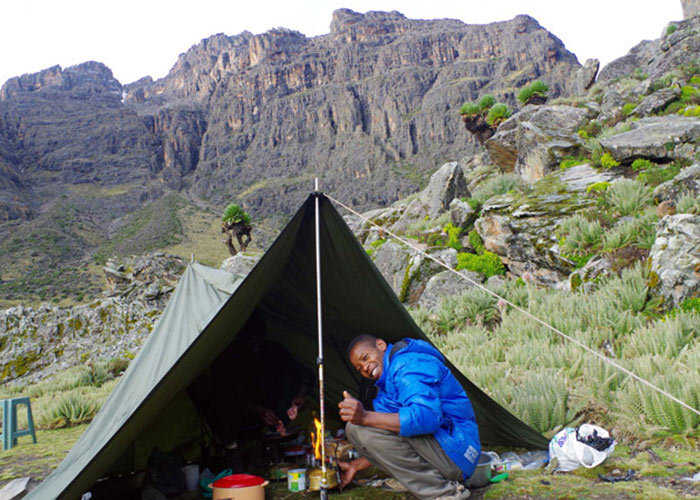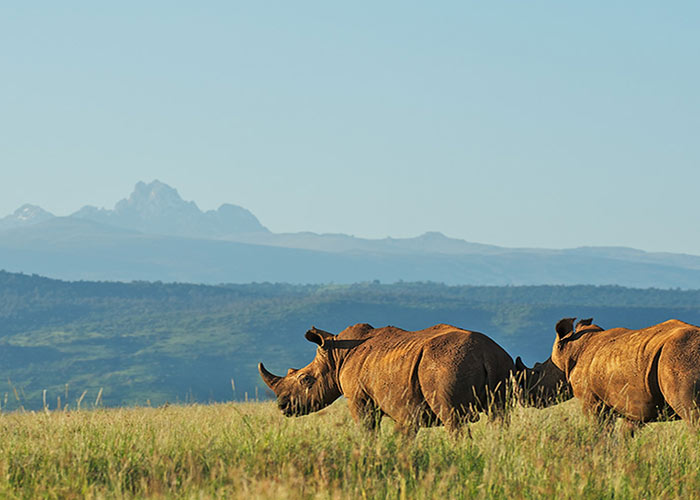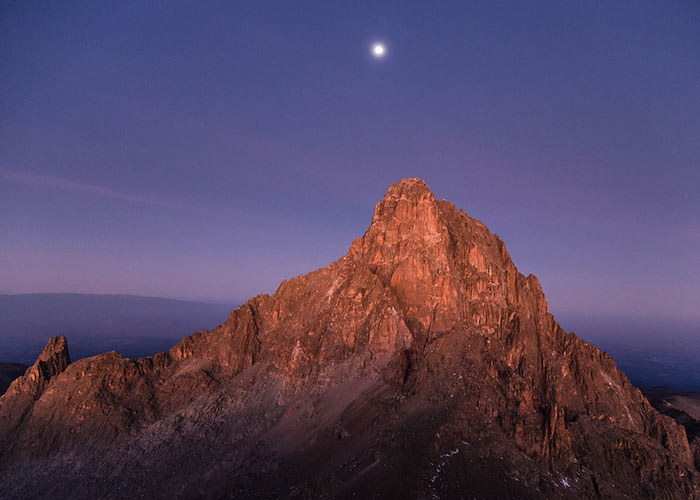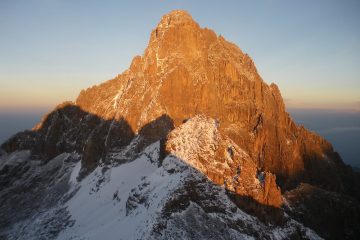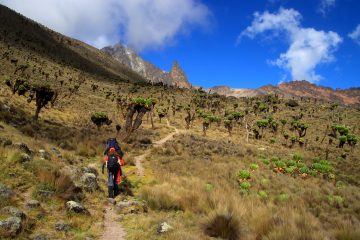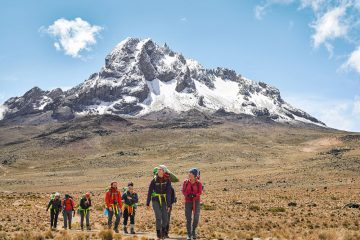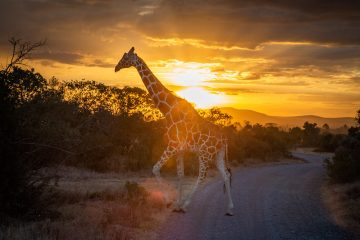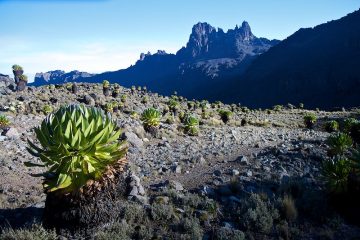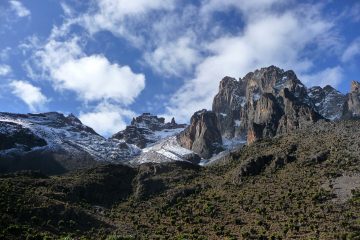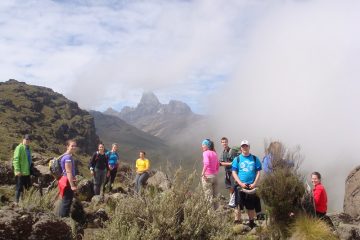All mountain guides and porters for Mount Kenya must have current KWS identification cards. These are legitimately licensed organizations that provide guide and porter services. This is advantageous to the traveler because guides and porters are permitted half-price access to the park with such a card. Any difficulties with the guides/porters may also be followed up on because they are recognized and registered groups rather than “unknown kids” from the streets of big cities, many of whom have criminal records and may have no mountain expertise. Receipts for payments paid to the park/reserve should be obtained and shown before departing. Rogue guides and porters should be avoided.
Should you climb Mount Kenya independently or with a guide?
There are many ways to climb Mount Kenya. You can request for us to arrange the trip for you and assign mountain guides for you or alternatively, you can climb Mount Kenya independently. We recommend you plan your Mount Kenya tour early enough so that your trek can go smoothly.
Pre Plan a Mount Kenya Tour With us
This is the greatest alternative if you are short on time. The majority of pre-arranged Mount Kenya climbs include transportation to and from Nairobi. At the lower end of the scale, your guide will meet you in Nairobi and accompany you on a public minibus (matatu) up the mountain. This saves a lot of money, but if it’s pouring, you’ll have to arrange for a 4wd to get to the park gates, which will cause delays and further charges. If you pay a bit extra, your trek will include a private vehicle transport from Nairobi.
Your trek team and equipment will be waiting for you at the summit, and you may start climbing right away.
Plan your journey from Nanyuki.
If you can get yourself to Nanyuki or Naro Moru you will be able to shop around and get guides and porters locally. This is a terrific approach to save money, but it will take a few days to put everything together. Tranquil Kilimanjaro is a good place to start. A good guide should be able to assist you in finding porters, a cook, and food, as well as making any necessary hut reservations.
Hiking Mount Kenya Solo (Alone) on your own
Only experienced hikers with substantial high altitude expertise should try it. Every year, climbers perish climbing Point Lenana on Mount Kenya; it’s easy to get lost under the cloud cover! If you wish to make the journey on your own, you’ll need to get to the park gates using mutatu and taxis. Because park officials do not allow trekkers to enter the park alone, you will need to go in pairs. You’ll need to bring all of your own supplies and equipment. The most difficult aspect of the mountain will be navigation. The paths aren’t well-marked, and there’s a lot of cloud cover.
If you don’t want to drag camping equipment, then there are shelters all the way on the Sirimon trail. If you do it on your own, don’t expect to be popular with the locals because it takes away their job.
Can I hire guides and porters at Mount Kenya?
If necessary, porters and guides for Point Lenana and other expeditions can be hired for around US $10 per day from I Naro Moru River Lodge, (ii) Mt. Kenya Transverses, (iii) Mountain Rock (previously Bantu Lodge), and (iv) Mt. Kenya Guides & Porters.
Porters must be carried to and from the roadheads (or extra days must be paid in lieu) and park/reserve entry fees must be paid (Special rates at K.Shs. 50 per day).
Mount Kenya Park Fees
The Kenya Wildlife Service (KWS) manages Mt Kenya, which is located inside the Mt Kenya National Park. Information on admission costs and other details may be found here.
Our Porters and Mountain Guides
- Have a lot of experience dealing with clients while trekking.
- Porters have at least two years of experience, while guides have at least four years.
- Both guides and porters communicate in English, with the exception of the guide, who speaks German.
- Mountain cook guarantees that you consume well-cooked meals and beverages while they are still hot.
- In the mountain, there is plenty of food as well as fruits.
- Our Mount Kenya guides and porters receive training from the National Outdoor Leadership School (NOLS), and they engage in Mountian Day clean-ups.
- The majority of the guides and porters we’ve chosen are either members of the following organizations:
- Chogoria Guides and Porters Association, Mount Kenya
- Mt Kenya Mountaneering Guides and Porters
- Mount Kenya Guides and porters safari Club
Mt Kenya Guides & Porters Safari Club
The most well-organized group of Naro Moru’s guides, chefs, and porters. A full-service trip, which includes a porter, meals, transportation, and lodging, costs US$120 per person per day; however, you may book only a guide ($20 per day) or a porter ($15 per day).
How much load are you allowed to carry on Mount Kenya?
On Mount Kenya, we offer a variety of tours. The overall pattern is that you carry almost all of your own gear in true adventure style. We will only take a few porters in this case, who will be ready to carry stuff in an emergency and provide additional help to the mountain guides. Tents, sleeping bags and mats, food, and personal clothing will be carried in this style. This may build up to 10-15kg at initially, depending on how much food you eat. Carrying all of your own stuff might be exhausting, but it can substantially improve the experience and sense of accomplishment.
We’ll keep the quantity of equipment we bring to a bare minimum (for safety), and we’ll store the rest of your luggage safely at Naro Moru until you return.
How much load are porters allowed to carry on Mount Kenya?
In a different trip structure, we can hire porters to help carry additional luggage. Porters will carry your luggage, gear, and food, but you will be requested to bring a daysack with some of your own personal items that you will need for the day, such as water, spare clothing, a camera, and waterproofs. This is usually between 5 and 6 kilograms. Every passenger will have their own porter to carry their luggage, ensuring that nothing goes missing.
We’ll keep the amount of equipment we bring to a bare minimum (to keep you safe), and we’ll store the rest of your luggage in Naro Moru until you return.
We can arrange for porters to carry more of the luggage in a different trip format. Porters will carry your luggage, gear, and food, but you will be asked to carry a daysack with some of your own personal items for the day, such as water, extra clothing, a camera, and waterproofs. Normally, this is around 5 or 6 kg. So that nothing is lost, each person will have their own porter.
Health and Safety and Guide Experience
Guides have a lot of expertise (which is important for spotting altitude sickness symptoms) and are well-trained in first aid (with refresher courses once a year). In the event that any member of a trip (client or crew) becomes unwell on the mountain, they are led to the next vehicle-accessible road head, evacuated from the mountain, and if required, sent to a good hospital that specializes in mountain-related diseases.
Related: Read more about Mount Kilimanjaro Guides and Porters

